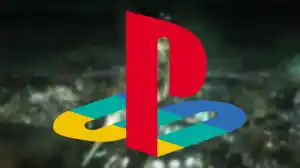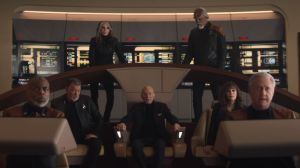Almost exactly a week ago, the film world was met with a unique surprise when The Cloverfield Paradox was unexpectedly released on Netflix. The third film in the Cloverfield franchise, which had been gearing up for a release for nearly two years, debuted its first trailer during the Super Bowl, with the entire film being released online shortly after.
Videos by ComicBook.com
This sort of surprise marketing certainly felt at home in the Cloverfield franchise, which has gone though unconventional means of promoting its films in the past. But in the week since Paradox‘s release, many have speculated about whether Netflix’s stunt ultimately paid off.
A lot of critics have panned the film, leading to an 18-percent rating (at the time of this writing) on Rotten Tomatoes. And some — including us — have argued that Paradox let down fans of the Cloverfield franchise, creating a rocky foundation for the entries that are to follow.
Granted, Paradox is not without its issues, with its reliance on tropes and plot holes leaving some viewers a little scorned. And admittedly, Paradox wasn’t initially meant to be tied to the Cloverfield franchise, with those connections being decided midway through production. But putting that aside and just taking The Cloverfield Paradox at face value, the film can be interpreted as an imperfect, but worthy entry to the “Cloververse” — and a sign of good things to come.
These days, film and television fandoms are almost always rife with online speculation, as eager fans try to analyzing and predict where storylines will go next. The Cloverfield fandom arguably takes that to a larger level, largely inspired by the franchise’s alternate reality game, or ARG.
The game, which began before the very first Cloverfield film, has led eager through a sort of ever-growing online scavenger hunt, and uncovered quite a few interesting clues along the way. The ARG has provided bits and pieces of worldbuilding, new mysteries surrounding particular characters, and even the first confirmation that Paradox would be part of the franchise.
With that in mind, Paradox provides an interesting development in the fans’ ever-growing quest for information. Even for those who have written off the film’s plot holes and overall storyline, the mere existence of these new unanswered questions opens up a new can of (space) worms.
What is the explanation behind any of the Shepherd team’s deaths? What was the point of following Michael and Molly back on Earth? And what exactly is up with the sentient arm? While we don’t know all of the answers right now, a lot of audience members are still intrigued to find out.
And as much as Paradox leaves things up in the air, it’s very existence provides a new sort of frame of reference for any other entries in the franchise. A running fan theory has been that Paradox‘s particle accelerator explosion helps kickstart the events of both Cloverfield and 10 Cloverfield Lane, by essentially providing a gateway for monsters to enter each of the films’ individual universes. This has been corroborated in a wide array of ways, from general Easter eggs and connections to one very specific, stunning piece of symmetry between Paradox and the original Cloverfield.
In a way, Paradox‘s introduction of the multiverse theory helps propel the entire Cloververse – and fan speculation about it – into a previously unforeseen direction. Bits and pieces of this have already been discovered by fans, with a line in Paradox potentially setting up the fourth installment, Overlord. There’s also a chance that Paradox (or, well, it’s ARG) helped set up the fifth installment in the Cloverfield franchise, which could end up being Kolma, a romantic science-fiction thriller starring Daisy Ridley.
Another way that Paradox could be seen as a positive step forward for the franchise isn’t just in the film itself, but in those who helped bring it to life. Paradox is the first franchise installment to have a person of color in the directors chair, with Julius Onah succeeding past Cloverfield directors Matt Reeves and Dan Trachtenberg. And this level of diversity can also be seen within Paradox‘s cast, with Gugu Mbatha-Raw carrying the film, and David Oyelowo, Roger Davies, John Ortiz, and Ziyi Zhang in supporting roles.
Considering the recent conversation about onscreen and offscreen diversity in the world of science fiction, the Cloverfield franchise using Paradox to elevate an up-and-coming POC director, and provide roles to a diverse cast, is something that has been worth celebrating. And arguably, that tactic will help the anthology continue to evolve, creating new audiences of fans who are eager to see themselves represented in front of and behind the camera in the franchise’s complex, genre-bending science fiction stories.
(And to an extent, this diversion away from white, male, American directors is only set to continue within the Cloververse, with Overlord being directed by Australian director Julius Avery, and Kolma potentially bringing in the franchise’s first female director, Marielle Heller.)
And ultimately, a major positive contribution that Paradox has made to the Cloverfield franchise is the very nature of its release. Having Netflix promote the film during the biggest television event of the year helped put the Cloverfield franchise back into the cultural conversation, something that hasn’t really happened since 10 Cloverfield Lane‘s debut back in 2016.
And having the film be made available almost-instantaneously on Netflix has arguably helped introduce or reintroduce the entire Cloververse to new audiences, especially those who wouldn’t have felt like forking over $10 to see Paradox in a theater. Even as the upcoming installments head back to theaters, that renewed interest in the franchise will be something worth keeping an eye on.
In the end, the conversation and debate around Paradox is sure to continue, and the overall reception to it might not be changing anytime soon. But as time marches on, there’s a chance that Paradox will be appreciated for what it is — and what it proves the Cloverfield franchise can be.
****
The Cloverfield Paradox is now streaming on Netflix.








